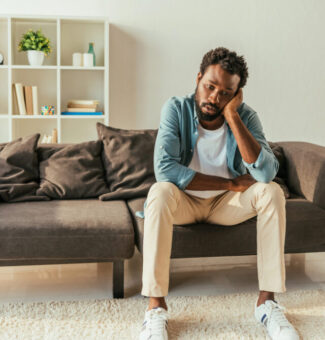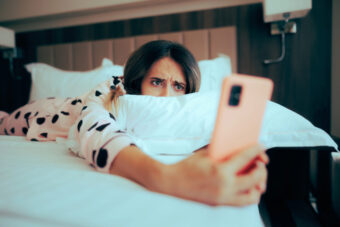While the holiday season is supposed to be filled with joy, connection, and lots of filling up on delicious holiday dishes, for many people, the pleasures fall short of their hopes. For some people, Thanksgiving and Christmas celebrations inspire stress, pressure to live up to family expectations, overeating to feed one’s emotional pain, along with psychological and/or physical isolation. Parents juggle restless kids in unfamiliar settings, hosts fret over creating “perfect” gatherings, and privacy can be hard to come by. Given the stressors of travel, pressure to ensure that everyone is ‘happy’, difficulty sleeping, and/or negative body image stirred up due to eating more than usual, these challenges can contribute to an overall body/mind/spirit feeling of “stuffed” and erotically and sexually unsatisfied.
According to a 2023 American Psychological Association survey, 43% of U.S. adults felt that the stress of the holidays makes it hard to enjoy them. In addition to that, a more recent 2025 study published in the Eating and Weight Disorders journal, Thomas et al. analyzed over 10 million social media posts that showed a body image dissatisfaction spike during this season. The study found that due to unwanted weight gain from the holidays, followed by New Year’s resolutions and fitness goals caused negative body-image issues. To strengthen this point, in 2023 Abdulan and his colleagues in Nutrients found that on Christmas, people ate 3 times their recommended daily calories with some meals coming out to almost over 6,000 calories.

Many therapy clients begin to experience anticipatory anxiety in early November as they begin planning for family gatherings, cooking and/or hosting responsibilities and the concerns around triggering old attachment wounds or trauma. If clients are already struggling in their dating, relationship and/or sex lives, figuring out how to sustain intimacy during Thanksgiving, Christmas, and New Year’s can fall way down on the list of other goals that are prioritized.
How Holiday Stress and Sleep Disruptions Impact Sexual Satisfaction and Functioning
Sex therapy clients report that when they travel for holiday gatherings, the first thing to get disrupted is their sleep schedule, which inevitably leads to less sex. While there’s plenty of research informing us of the importance of nightly sleep for overall mental health, there are even more disruptions during the holiday season due to several factors, including:
- Increased alcohol intake
- Children’s disrupted schedules
- Late-night conversations

The research backs up clinical observations. In a large wearable device study analyzing over 10 million sleep episodes, Heacock et al found that during major holidays, sleep regularity declined about 14%. That may seem subtle; however, in the Journal of National Sleep Foundation, Sletten et al. discovered that not only less sleep, but also inconsistent sleep can affect the body’s circadian rhythm. In their 2023 consensus, they found that having many different sleep times led to flatter cortisol rhythms and elevated stress.
In a 2019 Psychoneuroendocrinology study, Rosemary Basson and her colleagues discovered that lower morning cortisol can also be detrimental to one’s libido. More recent research echoes this connection between sleep quality and sex. In a 2023 study in the Journal of Psychosomatic Research, Pigeon et al. found that adults with poor sleep had significantly lower sexual satisfaction and higher rates of sexual dysfunction. The women in the study reported trouble orgasming and lower sex drive, and for the men, it was difficulty maintaining erections and lower sexual satisfaction.
Together, these studies show that disrupted sleep, which is very common during the holiday season, can dampen one’s mood, desire, and overall sexual pleasure. These problems contribute to less frequent sexual intimacy at a time when one may be in more need of that emotional closeness and tension release.
Why Women’s Negative Body Image Increases over the Holidays
Negative body image has always been a roadblock in women’s overall well-being and sexual desire, and pleasure. With the holiday season coming up, the challenge of internal body shame has the potential to increase. Between larger portions at holiday meals, endless photos for social media, the lure of diet culture, and relatives’ potential fat-shaming comments, many women report feeling torn between enjoying the food and celebration and fearing weight gain or self-loathing. Many sex therapy clients report being “in their head” during intimacy because of their internal body shaming, frequently comparing themselves to social media influencers who unrealistically portray society’s idealization of beauty standards.

In a 2024 study published in The Journal of Medical Internet Research, Anna Hinsch et al. investigated the relationship between Instagram use, self-criticism, and body dissatisfaction. Among the participants (90.2% of whom identified as women), those who spent over 3 hours/day viewing content centered around physical appearance exhibited higher levels of self-criticism and body dissatisfaction scores.
During the holidays, this internalized self-loathing can increase since social media platforms like Instagram and TikTok are flooded with photos of idealized tablescapes and holiday outfits modeled on ultra-thin women. Generally, this scrolling is continued during the holiday season as emotional regulation. Negative body image is associated with lower sexual desire, leading to decreased partnered or solo sexual activity.

